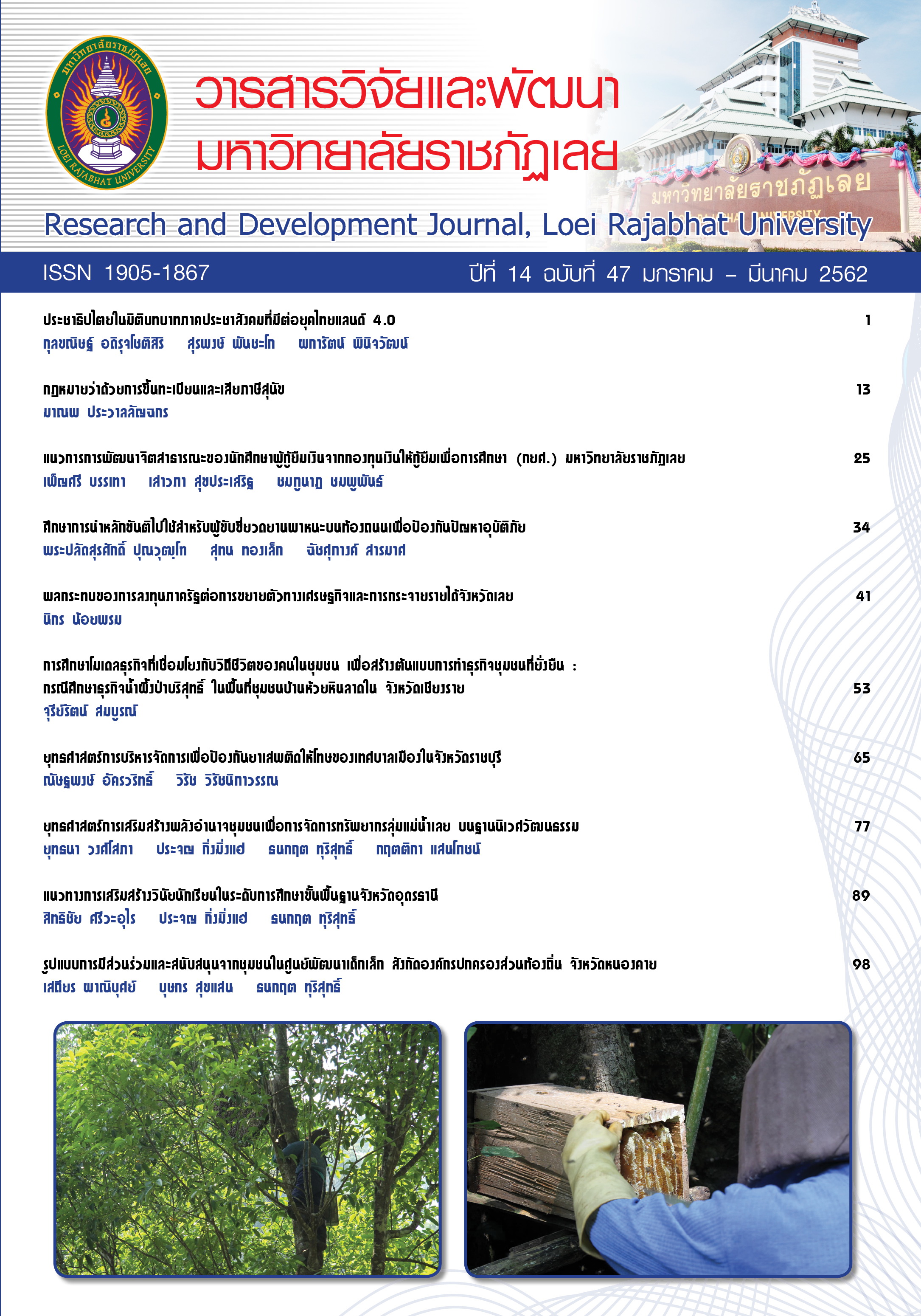ยุทธศาสตร์การเสริมสร้างพลังอำนาจชุมชนเพื่อการจัดการทรัพยากรลุ่มแม่น้ำเลย บนฐานนิเวศวัฒนธรรม
Keywords:
เสริมสร้างพลังอำนาจชุมชน, การจัดการทรัพยากรลุ่มน้ำ, แม่น้ำเลย, นิเวศวัฒนธรรม, empowerment of community, watershed resources management, Loei river watershed, ecological cultureAbstract
This research aimed to 1) study the context and problem situation of community for the Loei river watershed resources management and the factors determined the community authority on the watershed resources management based on the eco-culture. 2) create the empowerment strategy of community for Loei river watershed resources management on the ecological culture. 3) evaluate the empowerment strategy of community for Loei river watershed resources management on the ecological culture. This was the research and development which used the qualitative and quantitative methods. The sample were in 12 communities. The research instruments were the semi-structural interview, focused group interview, operative meetings, SWOT analysis, experiment and evaluated strategy. The research used the qualitative analysis and quantitative analysis. Use descriptive statistics, percentage, frequency, average and standard deviation.
The problems of community resources management: the information and situation probl ems, lack of searching and developing community potential, lack of community participation, lack of community institutional management, lack of planning, lack of resources management, lack of learning creation for the community member, lack of integration in the operation and unknown of community resources management boundary and lack of development of the community based economy. The factors determined the community authority in the resources management and the components that affected thinking, analysis and decision making processes on the community’s watershed resources; the task assignment, the perception of problem situation, access to information, skill and knowledge, the community participation, ecological and geological of the community, the community culture and tradition, authority or boundary of the community resources management, consistency of resources management and the community duration and information exchange.
The results of determining the strategies topics , which were 8 strategies such as 1) the increasing of efficiency and capacity of the community board related to the resources management, 2) the increment of the efficiency and capacity of community in the resources management and encouraged the community participation in planning for the community resources management, 3) promote the learning and using of local knowledge and wisdom for managing the watershed resources in line with the community culture and belief, 4) develop the community network and link the community network to support the Loei river watershed resources management by the community, 5) the strategy of increasing the efficiency of resources management by promoting the community tourism and promote the community based economy, 6) using the information technology to increase the capability of the resources management, 7) knowledge management of the community resources management and develop the policy proposal for the community resources management, 8) develop the monitoring and evaluating system for the community resources management. Overall, 8 strategies were possible to perform at the high level.
The experiment of the empowerment strategy in 4 communities selected the third strategy. The Community Empowerment Process Model consisted of; 1) discovering reality, 2) finding causes or conditions that lead to Powerlessness, 3) critical reflection, 4) define strategic issues, 5) strategic Decision Making, 6) empowerment for people or leaders in the community, 7) appropriate practice and, 8) lesson summary. These processes built research projects in 4 communities. When finished the research projects, the evaluation of the strategy trial found that the community increased the authority in all aspects: 1) community member performance, 2) community board or community working group structure, 3) community participation, 4) target defining resources management planning, 5) learning of ecology, culture and tradition, 6) authority and boundary of the community resources management, 7) information exchange. This could imply that the empowerment strategy of the community on Loei river watershed resources management on the ecological culture was the significant tool to build up the Loei river watershed community to gain knowledge, skills and capability of decision making according to the Loei river watershed resources management in consistency with the community culture to the sustainable development.
บทคัดย่อ
การวิจัยนี้มีวัตถุประสงค์เพื่อ 1) ศึกษาบริบท สภาพปัญหาการจัดการทรัพยากรของชุมชนในการจัดการทรัพยากรลุ่มแม่น้ำเลย และปัจจัยที่กำหนดพลังอำนาจชุมชนในการจัดการทรัพยากรลุ่มน้ำบนฐานนิเวศวัฒนธรรม 2) เพื่อสร้างยุทธศาสตร์การเสริมสร้างพลังอำนาจชุมชนเพื่อการจัดการทรัพยากรลุ่มแม่น้ำเลยบนฐานนิเวศวัฒนธรรม 3) เพื่อประเมินผลยุทธศาสตร์การเสริมสร้างพลังอำนาจชุมชนเพื่อการจัดการทรัพยากรลุ่มแม่น้ำเลยบนฐานนิเวศวัฒนธรรม การวิจัยเป็นการวิจัยและพัฒนา (Research and Development) ซึ่งใช้วิธีการวิจัยเชิงคุณภาพ (Qualitative research) และเชิงปริมาณ (Quantitative research) กลุ่มเป้าหมาย คือ ตัวแทนกลุ่มองค์กรชุมชน จำนวน 12 ชุมชนในลุ่มแม่น้ำเลย เครื่องมือการวิจัย ได้แก่ การสัมภาษณ์แบบกึ่งโครงสร้าง การสนทนากลุ่ม การประชุมเชิงปฏิบัติการ ใช้ SWOT Analysis เพื่อกำหนดยุทธศาสตร์ การทดลองปฏิบัติการและการประเมินยุทธศาสตร์ การวิจัยใช้การวิเคราะห์เชิงคุณภาพ และการวิเคราะห์เชิงปริมาณ ใช้สถิติเชิงพรรณนา ค่าร้อยละ ค่าความถี่ ค่าเฉลี่ยและส่วนเบี่ยงเบนมาตรฐาน
สภาพปัญหาในลุ่มแม่น้ำเลย ได้แก่ ด้านข้อมูลและสถานการณ์ ด้านการค้นหาและพัฒนาศักยภาพ ด้านการมี ส่วนร่วม ด้านการจัดการเชิงสถาบัน ด้านการวางแผนและการจัดการทรัพยากร ด้านการสร้างการเรียนรู้ให้กับสมาชิกในชุมชน ด้านการบูรณาการและไม่รู้ขอบเขตการจัดการทรัพยากร และด้านการพัฒนาเพื่อสร้างเศรษฐกิจชุมชน มีปัจจัยที่กำหนดพลังอำนาจชุมชนในการจัดการทรัพยากร ได้แก่ การมอบหมายบทบาทหน้าที่ การรับรู้สถานการณ์ปัญหา การเข้าถึงข้อมูลข่าวสาร ทักษะและองค์ความรู้ การมีส่วนร่วม ลักษณะทางภูมินิเวศหรือภูมิศาสตร์ ลักษณะของวัฒนธรรมและประเพณี อำนาจหรือขอบเขตในการจัดการทรัพยากร การจัดการทรัพยากรที่สอดคล้องกับสถานการณ์และช่วงเวลาของชุมชน และการแลกเปลี่ยนข้อมูลระหว่างชุมชน
ผลการกำหนดยุทธศาสตร์ทำให้ได้ 8 ประเด็นยุทธศาสตร์ ได้แก่ 1) การเพิ่มประสิทธิภาพและความสามารถของคณะกรรมการชุมชนในการจัดการทรัพยากร 2) การส่งเสริมการมีส่วนร่วมของชุมชนเพื่อจัดการทรัพยากรในชุมชนและส่งเสริมการจัดทำแผนการจัดการทรัพยากรชุมชนแบบมีส่วนร่วม 3) การเสริมสร้างการเรียนรู้และการใช้ความรู้ ภูมิปัญญาท้องถิ่นเพื่อการจัดการทรัพยากรลุ่มน้ำที่สอดคล้องกับวัฒนธรรมความเชื่อของชุมชน 4) การพัฒนาเครือข่ายชุมชนและเชื่อมโยงเครือข่ายชุมชนเพื่อเสริมหนุนการจัดการทรัพยากรลุ่มแม่น้ำเลยโดยชุมชน 5) ยุทธศาสตร์การเพิ่มประสิทธิการจัดการทรัพยากรเพื่อส่งเสริมการท่องเที่ยวและเสริมสร้างเศรษฐกิจฐานรากของชุมชน 6) การเพิ่มประสิทธิภาพการจัดการทรัพยากรโดยใช้เทคโนโลยีสารสนเทศ 7) การจัดการความรู้การจัดการทรัพยากรโดยชุมชนและพัฒนาข้อเสนอเชิงนโยบายเพื่อการจัดการทรัพยากรโดยชุมชน 8) การพัฒนาระบบการติดตามประเมินผลการจัดการทรัพยากรของชุมชน โดยทั้ง 8 ยุทธศาสตร์ มีค่าความเหมาะสมและมีความเป็นไปได้ในระดับมาก การทดลองการเสริมสร้างพลังอำนาจชุมชนใน 4 ชุมชน โดยเลือกยุทธศาสตร์ที่ 3 มีกระบวนการเสริมสร้างพลังอำนาจชุมชน (Community Empowerment Process Model) ดังนี้ 1) การเรียนรู้สถานการณ์จริงของชุมชน 2) การค้นหาสาเหตุหรือเงื่อนไขที่นำไปสู่ภาวะไร้อำนาจ 3) การสร้างความตระหนัก 4) การกำหนดประเด็นเชิงยุทธศาสตร์ 5) การตัดสินใจเลือกยุทธศาสตร์ 6) การสร้างพลังให้กับคนหรือแกนนำในชุมชน 7) การปฏิบัติการที่เหมาะสม 8) การสรุปบทเรียน จากผลการประเมินการทดลองใช้ยุทธศาสตร์ พบว่าชุมชนมีพลังอำนาจเพิ่มขึ้นในทุกด้าน ได้แก่ 1) ด้านการแสดงออกของสมาชิกในชุมชน 2) ด้านโครงสร้างคณะกรรมการหรือคณะทำงานของชุมชน 3) ด้านการมีส่วนร่วมของชุมชน 4) ด้านการกำหนดเป้าหมายและการจัดทำแผนการจัดการทรัพยากร 5) ด้านการเรียนรู้ภูมินิเวศ วัฒนธรรมและประเพณี 6) ด้านอำนาจและขอบเขตการจัดการทรัพยากรของชุมชน 7) ด้านการแลกเปลี่ยนข้อมูลข่าวสาร โดยพบว่าการแลกเปลี่ยนข้อมูลข่าวสาร มีระดับการปฏิบัติการมากที่สุดซึ่งจะนำไปสู่พลังอำนาจของชุมชนในการจัดการทรัพยากรของชุมชน นับได้ว่ายุทธศาสตร์การเสริมสร้างพลังอำนาจชุมชนเพื่อการจัดการทรัพยากรลุ่มแม่น้ำเลยบนฐานนิเวศวัฒนธรรม เป็นเครื่องมือสำคัญในการสร้างให้ชุมชนในลุ่มแม่น้ำเลยมีความรู้ มีทักษะ และมีความสามารถตัดสินใจในการจัดการทรัพยากรในลุ่มแม่น้ำเลยที่สอดคล้องวิถีวัฒนธรรมของชุมชนสู่การพัฒนาที่ยั่งยืน
Downloads
Published
Issue
Section
License
ข้อความที่ปรากฎในวารสารฉบับนี้เป็นความคิดเห็นของผู้เขียนแต่ละท่าน สถาบันวิจัยและพัฒนา มหาวิทยาลัยราชภัฏเลย และกองบรรณาธิการ ไม่จำเป็นต้องเห็นด้วยและไม่มีส่วนรับผิดชอบใดๆ
สถาบันวิจัยและพัฒนา มหาวิทยาลัยราชภัฏเลย ขอให้ผู้อ่านอ้างอิงในกรณีที่ท่านคัดลอกเนื้อหาบทความในวารสารฉบับนี้






